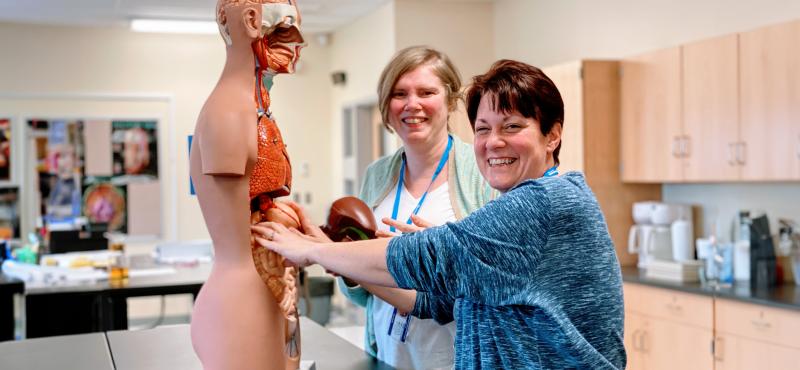Program Goals:
The Healthcare - Public Health Option prepares students for a career as a public health worker and/or prepares students with the first two years of a strong academic foundation required for transfer to a four-year bachelor’s degree program in public health or related field.
Student Learning Outcomes:
Upon completion of the program, graduates will be able to:
- Identify the roles and responsibilities of the public health worker.
- Identify the multiple ways public health affects daily living.
- Explain relationships between the social and behavioral sciences and public health.
- Implement strategies that promote behavior change.
- Understand safe practices as it relates to the public health role.
- Understand the similarities and differences in public and global health including demographic measures of health status and burden of disease.
- Understand the impact of the environment and communicable diseases on the health of populations.
- Describe the basis of chronic diseases on morbidity or mortality and approaches to prevention, early detection, and disease management.
- Understand the historical roots of epidemiological thinking and their contribution to the evolution of the scientific method.
- Describe the basic epidemiologic study designs that are used to test hypotheses, identify associations, and establish causation.
- Apply broad-based skills needed for problem solving in the many areas of public health.
- Participate in a co-operative experience directly related to public health.
- Demonstrate proficiency in the public and/or private sectors of public health.
- Develop multidisciplinary and collaborative strategies for solving health-related problems.
- Participate in a leadership role in health promotion and disease prevention.
Admissions Process:
Admissions inquiries should be directed to admissions@qcc.mass.edu. Prospective students may apply to the program of their choice by following the enrollment steps at www.QCC.edu/enrollment-steps.
Program Admissions Requirements:
Students should note that some first semester courses carry minimum prerequisites. Refer to the program grid.
- High School Diploma or GED/HiSET.
CORI, SORI, Finger Printing & Drug Testing:
Criminal Offender Record Information (CORI), Sex Offender Registry Information (SORI), and National Background checks are required in the program, either annually or every semester. Fingerprinting and drug testing may be required. Fingerprinting and drug testing results must meet clinical requirements. An issue with CORI/SORI, National Background, fingerprinting and/or drug testing could prevent a student from participating in a clinical/field rotation, which could result in dismissal from the program.
Additional Cost:
See the Program Fees page.
Technical Performance Standards:
See the Technical Performance Standards page. (Note: Not all programs have technical performance standards).
- The QCC Public Health program is deeply committed to diversity and fostering an inclusive environment that represents the diverse population of healthcare professionals. We value the uniqueness and potential of every learner and strive to create a culture of respect and equality, welcoming all students, including individuals with disabilities. We encourage students with disabilities to disclose their needs and seek accommodations to fully engage in our program. All disability-related conversations and requests are handled through a confidential process to protect the privacy of our students. After reviewing the Technical Performance Standards, students who have questions about accommodations should contact QCC Student Accessibility Services as soon as possible. Given the complexities of clinical-based programs, additional time may be needed to effectively implement accommodations.
- For more information, contact QCC Student Accessibility Services:
Credit for Prior Learning:
Credit for Prior Learning (CPL) allows students to use skills they already have towards a college degree or certificate. Work, life, volunteer and military experience may be translated into credit, allowing students to take fewer classes and earn their degree faster. CPL eliminates redundancies for students who have already earned credentials or mastered skills required for their program of study. Email experience@qcc.mass.edu for more information and eligibility.
Career Outlook:
Please consult the Massachusetts Career Information System at https://masscis.intocareers.org/ or the Occupational Outlook Handbook at www.bls.gov/ooh/ for specific occupational information. The CIP code for this program is 51.2208.
Transfer Articulations & Opportunities:
Prospective students may learn more about transfer articulation agreements at www.QCC.edu/agreements. More information regarding transfer opportunities is available at www.QCC.edu/transfer.


